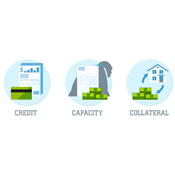How to Choose a Mortgage Lender
Finding the best home mortgage lender is about more than just the lowest rate. Learn how to shop for a mortgage and some common mistakes to avoid.
 |
Just as you wouldn't buy the first house you see, you may not want to go with the first mortgage lender that makes an offer. Basing it on who has the lowest rate doesn't work either.
You should:
- Know the lender's practices and track record.
- Conduct some research and even interview lenders.
This gives you the chance to compare your options. You do NOT want to choose a lender who is going to make the process more difficult than it needs to be.
Keep reading to learn more about this important process.
Different Types of Lenders
 |
| © CreditDonkey |
There are many different types of lenders. Not knowing the difference could leave you making the wrong decision.
For example, you may prefer a bank that keeps everything in-house and makes their own decisions.
On the other hand, maybe you prefer to have many choices at your disposal. Your preferences determine the type of lender you should choose.
- Mortgage bankers: The most common type of lender is the mortgage banker. They originate, process, and underwrite your loan in-house. They even fund it at the closing.
Once they close the loan, they usually sell it on the secondary market. The secondary market has investors waiting to purchase mortgage securities that meet their guidelines.
You Should Know: A mortgage banker usually has many loan programs available. It may differ based on the number of investors at the time.The secondary market is a pool of investors willing to purchase mortgage securities. The most common are Fannie Mae and Freddie Mac.
There are also private investors, too. Each investor has specific requirements the loan must meet. This is why some loans seem to have very strict requirements.
- Portfolio lenders: These lenders do not sell the mortgages they originate. Instead, they keep them on their portfolio. This way, they have no other investors to please.
The lender itself determines the guidelines. They can take unique situations if they think it is right.
Sometimes, after a year or so, they may sell your loan to the secondary market. Portfolio lenders can often "bend" the rules a little more easily.
- Correspondent lenders: These lenders provide loans that the "big banks" service down the road. Think of banks like Chase or Wells Fargo - this is where these loans go.
The correspondent lender doesn't do any of the underwriting in-house. They are just an extension of the available programs from several large banks. It is like shopping around but with the help of a single loan officer.
- Subprime lenders: Borrowers with a low credit score often need a subprime lender. They usually have more flexible guidelines.
You Should Know: Even borrowers with good credit but a high debt ratio may use a subprime lender. The interest rates may be higher, but they are often still affordable.
- Mortgage broker: A broker acts as a middleman. They originate the loan and then contact various banks to see if they would approve it.
The broker does all of the communicating and processing, but everything else is done outside of the broker. The broker receives payment from the bank that provides your loan.
Brokers may also charge their own fees at the closing as well.
Qualities of a Good Lender
 |
| © CreditDonkey |
What makes a good lender? Everyone's answer will differ. Some people prefer smaller lenders with personal service. Others care more about the cost of the loan and want the best deal.
These are personal decisions. The basic qualities of any lender should be honesty and helpfulness, though. When you just start the process, you may have many questions. You need a lender willing to answer them truthfully.
For example, they know how to look at credit histories. If they see a red flag, they should tell you about it and help you learn how to fix it.
Everything in your credit is fixable; it just takes time and the right methods.
You also want a lender willing to tell you the long-term effects of your choices. For example, knowing the effects of an adjustable rate and fixed rate mortgage is important.
An adjustable rate may sound promising right now because of its low interest rate. If you don't know how the rate adjusts, you could be in for an ugly surprise. The right lender offers details and helps you base your decision on today and the future.
The same is true for a conventional loan versus an FHA loan. If you don't know the difference, you need a loan officer willing to explain it.
Also, a lender who speaks only in mortgage jargon may not be right. If they don't simplify the terms for a first-time homebuyer, consider another lender.
You need things put into understandable terms. You shouldn't feel embarrassed to ask for clarification or explanation of the many terms likely to be thrown at you.
Do Your Research
Referrals are good, but you should still do your own research. Learn as much as you can about any lender. Understand what they expect and how they process loans. This gives you an idea of how they conduct business.
For example, let's say your Uncle John put 50% down on his home purchase because he sold his previous home. He is in a different boat than you, a first-time homebuyer.
As a first-time homebuyer, you need a lender willing to walk you through the steps. If you use referrals, use those that compare to your situation.
Shop Around for a Mortgage
Ask some of the following questions of a potential lender to make sure you're partnering with a good fit for your needs:
- Do you service your loans in-house or sell them? If it will be sold, find out to whom so you can determine if you want to deal with that lender moving forward.
- What is your turnaround time? Every lender has a different workload. If you have a specific timeframe to work within, this is an important question.
- When do you allow borrowers to lock in their interest rate?
- What happens if the rate lock expires?
- How do they handle specific problems with appraisals?
- What are your closing fees?
- How will we communicate - phone or email?
- How often will I get updates?
These questions help you get to know a lender and their policies. For example, if you already have a house in mind, you need to work fast. If a lender is backed up and underwriting may take 3 weeks, it may not work with your timeline.
You may also want to avoid lenders who offer very long rate locks, as the longer the lock, the higher the cost.
Make Comparing Easy
Once you narrow your choices down to a few lenders, you should compare them. Each lender you submit an application to must send you a loan estimate within three business days. This document helps you see the:
- Interest rate
- Loan terms
- Fees
As you compare, don't focus solely on the cost of the loan now. Think of the future and how you want to handle your mortgage.
For example, do you want to be mortgage-free in 15 years? Then focus on the 15-year terms.
Once you narrow the loans down to the same type, you can compare them. Look at the APR (annual percentage rate). This shows you an effective rate of the cost over the life of the loan. This gives you a better idea of how much the loan actually costs.
Of course, keep an eye on the lender's fees. If everything else is similar, compare points and closing costs.
Would you rather save more money now by not paying the point? You would pay the higher interest rate over the life of the loan, though. If you pay the point, you get the lower rate.
This goes back to your future plans. If you think you will stay in the home for the entire term, you may want the lower interest rate. This means paying the point.
However, you have the lower interest rate for the next 30 years. If you will move in a few years, though, you might be better off just paying the higher interest rate temporarily.
The Bottom Line
You get out of the mortgage process what you put into it. The more legwork you do, the better choice you will make.
At the very least, learn the various mortgage terms. This gives you a basic understanding of the mortgage industry and what to expect.
That way you can make an informed decision when choosing the right lender for your situation.
Write to Kim P at feedback@creditdonkey.com. Follow us on Twitter and Facebook for our latest posts.
Note: This website is made possible through financial relationships with some of the products and services mentioned on this site. We may receive compensation if you shop through links in our content. You do not have to use our links, but you help support CreditDonkey if you do.
Read Next:






